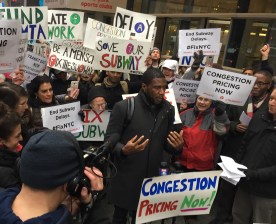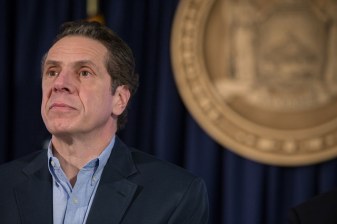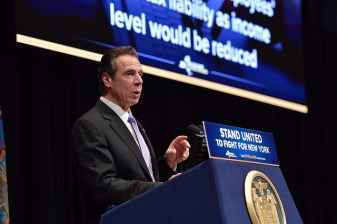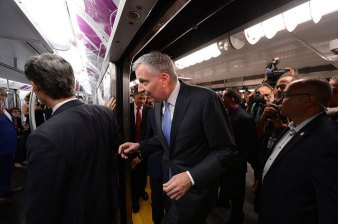Broad Business-Labor Coalition Ready to Back Congestion Pricing If Cuomo Releases a Strong Plan
The governor will release his revised budget tomorrow, and it's not clear whether congestion pricing will be included.

On Thursday, Governor Cuomo will release his revised budget, which is seen as a critical milestone on the way to enacting a congestion pricing plan this session. If Cuomo puts forward a bold plan to reduce traffic, aiming for the high end of the recommendations from his own Fix NYC panel, he’ll have the support of an impressively broad coalition that spans the interests of business and labor.
Transit advocates have naturally coalesced around congestion pricing, as have environmental groups like the NRDC and the League of Conservation Voters, but they’re far from alone. The emerging big-tent coalition for congestion pricing includes the city’s business elite, large unions representing hundreds of thousands of workers, and anti-poverty advocates.
On the business side, the Partnership for New York City, which represents large employers, has warned that the city will sustain $20 billion in annual economic losses over the next five years without congestion pricing. On Friday, a group of real estate developers sent a letter to Assembly Speaker Carl Heastie urging him to “strongly advocate and pass” the Fix NYC proposal [PDF].
Meanwhile, the Community Service Society, which advocates for the city’s working poor, has shown how congestion fees would help, not hurt, low-income New Yorkers who overwhelmingly rely on transit to get around and would especially benefit from discount fares that a new revenue stream could fund. In October, the environmental-labor coalition ALIGN-NY put out a report with the grassroots neighborhood group New York Communities for Change endorsing both congestion pricing and Mayor de Blasio’s proposed millionaire’s tax [PDF].
Congestion pricing also has the backing of TWU Local 100 President Tony Utano, whose union represents most of the MTA’s workforce. The TWU had previously signed on in support of the Move NY toll reform plan.
Against this coalition, there is a small share of commuters who drive into Manhattan each day and feel intensely opposed to paying for something that’s been free until now. And poll numbers may show Cuomo the generalized anxiety people feel when the idea of congestion pricing starts percolating but the benefits remain intangible.
But we know from the experience of other cities that implementing an effective congestion pricing plan is a winner in the court of public opinion.
And there are signs that the political landscape in Albany is more conducive to enacting congestion pricing than it was 10 years ago, when key legislators from NYC districts sat on the sidelines. Lawmakers who hold those seats today, like Jo Anne Simon and Brian Kavanagh, are clearly on the record supporting congestion pricing.
In Albany on Monday, the Riders Alliance rallied with representatives from all five boroughs to call for a new long-term revenue stream for the MTA. While those elected officials may still need some convincing on congestion pricing, they were standing next to advocates who explicitly endorsed it.
The draft budget Cuomo released last month did not include congestion pricing legislation. Thursday’s release is viewed as the last opportunity to introduce congestion pricing as part of budget negotiations, though it could surface later in the session as a standalone bill.
When Cuomo puts out a plan, it has to pack a punch. A lot of people are waiting in the wings to put a strong package for traffic reduction and transit funding over the top in Albany.



